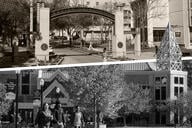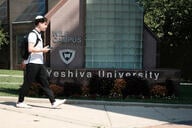You have /5 articles left.
Sign up for a free account or log in.
"You have a white church and you have a Negro church. You have allowed segregation to creep into the doors of the church. How can such a division exist in the true Body of Christ? You must face the tragic fact that when you stand at 11:00 on Sunday morning to sing ‘All Hail the Power of Jesus Name’ and ‘Dear Lord and Father of all Mankind,’ you stand in the most segregated hour of Christian America."
--Martin Luther King Jr.
King's words, delivered in 1956, ring true today. Just ask Denise Isom. Isom is an African-American education professor at Michigan’s Calvin College who asked this fall for an exemption to the evangelical college’s requirement that all faculty join a Christian Reformed Church (or one in another denomination in “ecclesiastical fellowship” with the Dutch-rooted church, known as the CRC).
“Each day, in formal and informal ways, I must address the issues of race and culture, often engaging in ways that carry a psychological, emotional, social, and physical cost,” Isom wrote in a letter requesting an exemption so that she could join a black Baptist church instead. “Though there are CRC churches and communities that are striving to reflect a multicultural vision in the church's make-up and worship content, they are not ‘there’ yet. As a person who has long worked towards those ends in predominately white settings, I find myself at a place where, for emotional, social, and spiritual health, I need a place of worship that is already consistent with my culture and able to grapple with issues of race in ways which make it a respite, a re-charging and growing place for me, as opposed to another location where I must ‘work’ and where I am ‘other.’”
Furthermore, she wrote, “As someone for whom research, scholarship, and service are centered around issues of social justice, race, culture, and gender, I need to be intimately tied to populations of people of color.” She added that she plans to conduct research on racialized gender identity among African-American children in a church setting.
Calvin’s Board of Trustees rejected Isom’s request in October. The board’s decision to decline the exemption request meant that, unless she joined a church in accordance with Calvin’s requirement (one of three faith-based requirements Calvin faculty must meet), her tenure-track appointment would be reverted to a term appointment that would expire at the end of 2008-9. Isom did not return requests for comment. Others contacted described the ball as now being in her court.
Beyond Isom's particular professional future, the board’s action set the stage for some soul-searching at the liberal arts college -- where officials stressed that to maintain Calvin’s identity, they could not bend the rules (a spokesman said that while he did not know the number of exemptions to the church membership requirement in recent years, the college has in the past granted a few requests, generally to faculty ordained in a different denomination). “For more than 130 years Calvin has been affiliated with the Christian Reformed Church, and we believe that Reformed theology and a Reformed world and life view and heritage have served the college well,” Calvin’s provost, Claudia Beversluis, said in a written statement. “The history of Christian institutions of higher education in this country justifies caution in this area. Nearly all Christian colleges and universities that distanced themselves from their founding denominations and theological traditions eventually also drifted away from being Christian in any meaningful way.”
Beversluis continued: “This has been a difficult case for many at the college especially because we are committed to diversity in our students, staff and faculty…. But we also are committed to remaining a Reformed community. We believe that there is room in higher education for a wide variety of colleges, including secular and Christian, and that within the realm of Christian colleges there needs to be room for distinctively Catholic institutions, distinctively Baptist institutions, distinctively Reformed institutions and many others.”
The conflict at Calvin highlights the challenge of recruiting and maintaining a diverse faculty, staff and student body at Christian institutions rooted in particular churches – that tend to predominantly attract members from one race over any other. As such, in recent years, Christian colleges across the country have increasingly described a need to enhance ethnic diversity on their campuses.
But Calvin does face particular challenges relative even to its evangelical peers. Many Christian colleges require faculty to sign on to a statement of faith, but Calvin goes further to add on the church membership requirement and a requirement that faculty send their children to Christian schools as well.
And, given the Dutch roots of the Christian Reformed Church, “Calvin’s in somewhat of a unique tradition because its faith test is essentially both religious and ethnic,” pointed out Alan Wolfe, a professor of political science and director of the Boisi Center for Religion and American Public Life at Boston College. “Imagine a national search trying to find an African-American Calvinist. It’s going to be difficult.”
“I would think that in terms of any real, genuine attempt to be successful in a faculty diversity effort, to have that limitation [relative to church membership] is certainly one that’s not going to help you,” said Nelvia Brady-Hampton, a professor of business and director of ethnic diversity at Trinity Christian College in Illinois. Trinity is also a college in the Reformed tradition, but Brady-Hampton, an African-American, said it doesn’t have a restrictive church membership requirement like Calvin’s (“Frankly," she said, "if that were the requirement at Trinity, I wouldn’t be there." Brady-Hampton is a member of the United Church of Christ).
“If your church is non-diverse, and you limit your faculty to members of the church, how can you ever expect to get there?” she asked, relative to the ideal of a diverse campus.
Officials at the Christian Reformed Church did not respond to requests for comment Thursday relative to their own efforts to expand the ethnic diversity within the church. As for Calvin, the college released From Every Nation, a much-trumpeted “comprehensive plan for racial justice, reconciliation, and cross-cultural engagement” in 2004, along with related guidelines for faculty and staff hiring. Isom herself was recruited to Calvin through a fellowship program specifically for prospective minority faculty members (as explained in this profile in Mosaic, a Calvin newsletter focusing on diversity). Calvin has a number of programs in place to recruit minority students (6.3 percent of Calvin's 4,224 students are students of color). In 2001, Calvin, along with New York's Nyack College, received the Council for Christian Colleges and Universities’ Robert and Susan Andringa Award for Advancing Racial Harmony.
Calvin “strongly seeks to be diverse, but has such deep theological and ethnic roots that it's a challenge for them,” said Richard Gathro, senior fellow at the council. He emphasized that it's not the fairly common requirement that faculty sign on to a particular statement or subscription of faith that limits Calvin's recruiting pool so much as its restriction on specific church membership or worship style. "There’s a certain style of doing church that’s more ethnically connected," Gathro said.
Just 23, or 7.1 percent, of Calvin’s 322 full-time faculty members are minorities. Isom is the only full-time minority faculty member in the education department, said its chair, Robert Keeley, who endorsed Isom’s exemption request. As did the department as a whole.
“I was disappointed," Keeley said of the board's decision. "I understood their reasons but I’d hoped that they would see things differently than they did."
"It’s been a challenge for us, because we felt that we might now, if Professor Isom does indeed leave, lose a friend and a colleague and a valued member of our department. We also thought that this was a good opportunity for Calvin to take a step in making it easier for people of color to join our community. Both of those things disappointed," Keeley said.
“I respect that Calvin College wants to be intentional in trying to establish itself as an important theological voice among its peer institutions around the country. The fact is denominational colleges such as Calvin have shrunk in American higher education,” Randal Jelks wrote in an e-mail. An associate professor of history who recruited Isom to Calvin, Jelks is resigning from Calvin as of May to focus on research to a greater extent than he could at a teaching-oriented institution. He's currently on a leave of absence from Calvin as a visiting professor of American Studies at the University of Kansas.
“Where I disagree,” Jelks said, "is that the college administration and trustees have tried to carry out the notion of having highly trained scholars who think in sophisticated ways about theology so narrowly. They insist on using parameters that make a mockery of the rich intellectual diversity which the Calvin faculty members represent and their religious understandings.”




